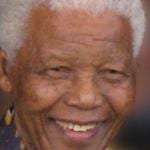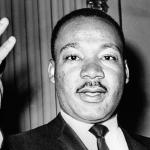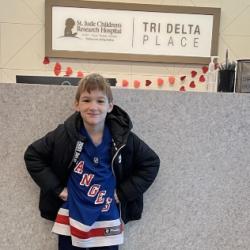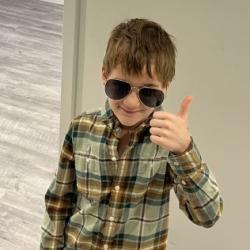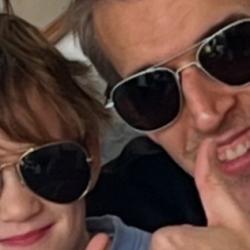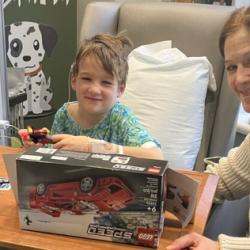It could only be by faith, at least our leap of faith on that fateful day.
That, and a bushido samurai spirit of being willing to die. In all fairness, in our situation, it was most likely just severe injury. But winning, losing, death (or severe injury) was not the concern. Like the samurai, our honor was at stake.
From top to bottom, the street was around a 45-60 degree decline feeding into a nice cul-de-sac landing zone, about 200 yards in total. What birthed as an idea became reality. Sort of. A father-son bonding project, a work of craftsmanship, a memory in the making. Our soapbox. It would be greased lightning. It would have to be made by hand. We wouldn’t have it any other way. The trips to the hardware store would be many. And so we began; as the typical father-son project goes, we ran out of gas half way through. But the vision was there. It would have advanced steering, vintage breaks, an enclosed frame for safety, and a signature paint job.
What resulted was a frame connected to wheels and a cut up power cord attached to both wheels for steering. No steering wheel, no breaks, just a wooden frame on some wheels, a very steep slope, and a 200 yard journey. We would own this hill. Come what may, victory or immense pain. Father and son, bushido spirit, give us liberty or give us death, we had made too many trips to the hardware store to turn back now. Too many hours in the hot sun to let rationality or science discourage our intent.
It did not take long for us to realize that gravity doesn’t empathize. My father quickly realizing his outer layer of skin on his hand would have to help slow us – and some quick thinking to power cord steer us into the curb. A collision, nasty spill, and men overboard would all ensue. Hands scraped, knees and elbows bloodied, we survived – we embodied the Nietzschean mantra of “what doesn’t kill you makes you stronger”. Honor was ours. My mother was not impressed.
For Aristotle, the idea of scientia as knowledge is a profound one that includes a broad encapsulation of science and philosophy. These are certainly different domains of knowledge, but they also inform each other, and help us make both simple and profound decisions in life. Philosopher Massimo Pigliucci calls this concept “sci-phi” and reminds us its not about their specific scientific or philosophical positions at the time, but the concept of approaching “the big questions in both a philosophical and a scientific manner”. [1]
Before we took the hill, the faith pumping through our veins was a blind trust, father/son testosterone, and existential plunge into the unknown – bushido without scientia. But after this experience, a new type of faith would have to emerge. This new faith (and my mother) would require trust. Not certainty, as there is rarely certainty with anything in life; especially with our most cherished beliefs, but perhaps something more to rationally ground our bushido.
For whatever cherished belief we have, we come to the uncomfortable realization that for it to be anything beyond blind faith, reality must confront it – challenge it. Trust, after all, is earned. If knowledge is justified true belief, but we can’t know for certain if something is true, we’re left with justified belief. Welcoming a search warrant can be uncomfortable. We don’t exactly jump up and down to put our most cherished beliefs through the ringer. For the truth-seeker, though, there could be no other way.
For many traditional religionists, there is only faith alone. For many traditional scientists, “only scientific propositions are truth-apt”. Both positions are problematic. Scientia requires more. For Aquinas and philosophical theists, reason is the preamble to faith. Like a mature lifelong marriage commitment, there must be a strong rational bedrock; a trust based on experience of the known to warrant faith in the unknown. For the philosophical atheist, she may reason there is no strong rational basis for God, but she also knows “only scientific propositions are truth-apt” is not a scientific statement, but a philosophical one, hence self-refuting.
Scientia requires more – philosophical and scientific inquiry. Bruce Lee brilliantly said “research your own experience; absorb what is useful; reject what is useless; add what is specifically your own.” He created Jeet Kune Do to be a style without a style, an art that that incorporates all arts – using whatever works from all traditions – at the right moment in a specific situation. We now have an MMA octagon as an epistemological crucible where martial arts traditions can be tested against each other.
Whether it be the martial arts, religion, or politics of our youth; will we volunteer our most cherished beliefs up to scientia’s octagon of ideas? The truth seeker need not fear. Where I once was on top of that hill, I’ll never be again. That was Soapbox Faith, bushido without scientia. Reality has now confronted that experience. With scars (and some laughs), I have learned. It didn’t kill me and I am indeed stronger – and reason and science are now part of the journey. A hope remains, a speculation into the unknown, but this one is closer to truth, hopefully with less scars for the next hill I take. For the journeys ahead, faith in anything will require trust, a justified belief, the place where bushido meets scientia. This is the spirit and aim of my blog, writing, and podcast. Soapbox Faith is now Soapbox Redemption.
References
[1] Pigliucci, Massimo. 2012. Answers for Aristotle: How Science and Philosophy Can Lead us to a More Meaningful Life. New York: Basic Books, 6.
Image credit
Daniel Case, The Walden, New York Soapbox Derby


